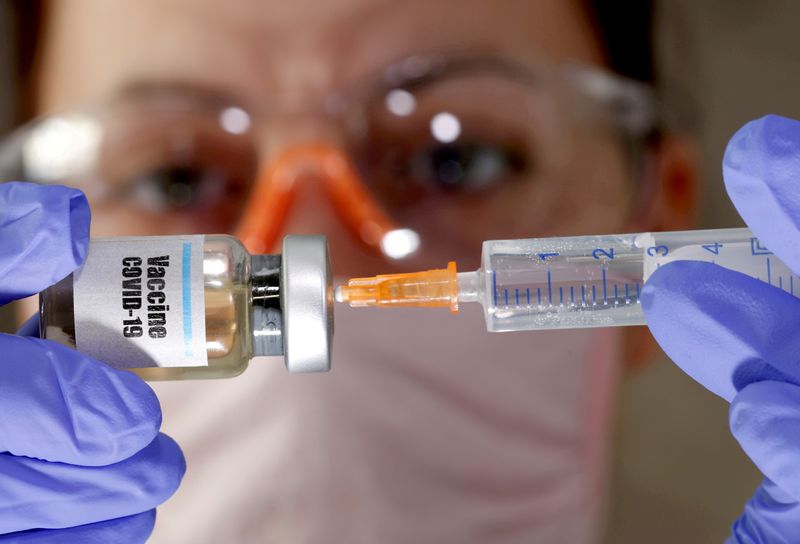By Carl O'Donnell
NEW YORK (Reuters) - Drugmakers and research centers around the world are working on COVID-19 vaccines, with large global trials of several of the candidates involving tens of thousands of participants well underway.
The following is what we know about the race to deliver vaccines to help end the coronavirus pandemic that has claimed over 1.25 million lives worldwide:
Who is furthest along?
U.S. drugmaker Pfizer Inc (N:PFE) and German partner BioNTech SE (O:BNTX) (DE:22UAy) are the first to announce data from a late-stage clinical trial.
The next data releases will likely be from U.S. biotech firm Moderna Inc (O:MRNA), possibly in November, and from Britain-based AstraZeneca Plc (L:AZN) with the University of Oxford in November or December. Johnson & Johnson (N:JNJ) says it is on track to deliver data this year.
What happens in these trials?
The companies are testing their vaccines against a placebo - typically saline solution - in healthy volunteers to see if the rate of COVID-19 infection among those who got the vaccine is significantly lower than in those who received the dummy shot.
Why is Pfizer ahead with its data?
The trials rely on subjects becoming naturally infected with the coronavirus, so how long it takes to generate results largely depends on how pervasive the virus is where trials are being conducted. Each drugmaker has targeted a specific number of infections to trigger a first analysis of their data.
AstraZeneca said last week a slowdown in infections during the summer is delaying data analysis for its UK trial.
COVID-19 cases, however, soared in October and early November, setting daily records in the United States and Europe.
How well are the vaccines supposed to work?
The World Health Organization has recommended a minimum standard for effectiveness of at least 50%. The United States and some other regulators are following that guideline – which means there must be at least twice as many infections among volunteers who received a placebo as among those in the vaccine group. The European Medicines Agency has said it may accept a lower efficacy level.
When will regulators decide on safety and efficacy?
Regulators review vaccines after companies submit applications seeking either emergency use authorization (EUA) or formal approval.
The earliest the U.S. Food and Drug Administration could make a decision is in December because Pfizer/BioNtech and Moderna do not expect to have enough safety data until the second half of November. The FDA has asked companies to watch trial participants for side effects for two months after receiving a final vaccine dose.
Regulators for Europe, the United Kingdom and Canada are considering data on a rolling basis, as it becomes available. They expect to conduct expedited reviews as well. It is not clear when companies will submit efficacy data to these agencies or when the agencies would make a decision.
Could these be the first widely available coronavirus vaccines?
Yes, although China and Russia are on a similar timeline. China launched an emergency use program in July aimed at essential workers and others at high risk of infection that has vaccinated hundreds of thousands of people.
At least four vaccines are far along including those from China National Biotec Group [CHNAPF.UL] (CNBG), CanSino Biologics (HK:6185) and Sinovac. Sinovac and CNBG have said to expect early trial data as soon as November.

Russia's Gamaleya Institute has begun a 40,000-person late-stage trial and is expected to have early data in November. Russia has also given the vaccine to at least hundreds of "high-risk" members of the general population.